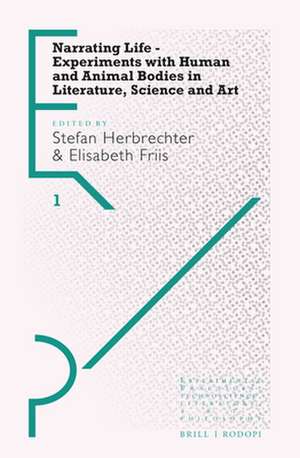Narrating Life – Experiments with Human and Animal Bodies in Literature, Science and Art: Experimental Practices, cartea 1
Stefan Herbrechter, Elisabeth Friisen Limba Engleză Hardback – 17 feb 2016
Contributors: Amelie Björck, Elisabeth Friis, Holly Henry, Stefan Herbrechter, Tom Idema, Moritz Ingwersen, Cristina Iuli, Tanja Nusser, Angela Rawlings, Manuela Rossini, Dorion Sagan, Laura Shackelford, Amalie Smith, Marianne Sommer, Steve Tomasula, David Wagner, Jeff Wallace, Dominik Zechner.
Preț: 712.27 lei
Preț vechi: 868.61 lei
-18% Nou
Puncte Express: 1068
Preț estimativ în valută:
136.31€ • 141.78$ • 112.53£
136.31€ • 141.78$ • 112.53£
Carte indisponibilă temporar
Doresc să fiu notificat când acest titlu va fi disponibil:
Se trimite...
Preluare comenzi: 021 569.72.76
Specificații
ISBN-13: 9789004302594
ISBN-10: 900430259X
Pagini: 336
Dimensiuni: 155 x 235 mm
Greutate: 0.64 kg
Editura: Brill
Colecția Brill
Seria Experimental Practices
ISBN-10: 900430259X
Pagini: 336
Dimensiuni: 155 x 235 mm
Greutate: 0.64 kg
Editura: Brill
Colecția Brill
Seria Experimental Practices
Notă biografică
Stefan Herbrechter is a Research Fellow at Coventry University and Privatdozent at Heidelberg University. He is the author of Posthumanism: A Critical Analysis and general editor of the Brill series Critical Posthumanisms. For more information please see http://stefanherbrechter.com.
Elisabeth Friis is Associate Professor at the Department of Comparative Literature, Lund University. She is the editor of the journal Kritik and editor of several of Clarice Lispector’s works. Her research interests include: Homer and (non-)anthropomorphism, oral theory, feminism & posthumanism, ecopoetics and contemporary poetry.
Elisabeth Friis is Associate Professor at the Department of Comparative Literature, Lund University. She is the editor of the journal Kritik and editor of several of Clarice Lispector’s works. Her research interests include: Homer and (non-)anthropomorphism, oral theory, feminism & posthumanism, ecopoetics and contemporary poetry.
Cuprins
Table of Contents
Acknowledgments
1 - Stefan Herbrechter, Narrating(-)Life – In Lieu of an Introduction
2 - Fiction: David Wagner, Life/Lives
Narrating Life in Literature
3 - Elisabeth Friis, In my core I have the strange impression that I don’t belong to the human species: Clarice Lispector’s Água viva as Life Writing?
4 - Holly Henry, Charting Solar Systems, Exoplanets and Earth 2.0
5- Tom Idema, Species Encounters: O. Butler Meets Haraway Meets Deleuze and Guattari
6 - Moritz Ingwersen, Solid-State Fiction: J.G. Ballard and the Crystallization of Life
7 - Cristina Iuli, Dissonance, Data, and DNA: Aesthetics, Biopolitics and Transgenic Music in Richard Powers’ Orfeo
8 - Tanja Nusser, “Chromosomal cuties”, “fembots”, “chatty cyber trio” or “cantankerous clones”? Lynn Hershman Leeson’s Film Teknolust
9 - Manuela Rossini, Submarine Experiments with Human Lives by Christoph Ransmayr – a Waterman Narrates
10 - Laura Shackelford, In Toxicating Languages of Bioinformatic Circulation: Poetics and Other “Smallwork” in The Flame Alphabet
11 - Jeff Wallace, Life Beyond “Critique”: Murakami after Latour
12 - Dominik Zechner, Aporias of Survival: Kafka’s Alien Incursion
13 - Fiction: Steve Tomasula, The Atlas of Man (If by Man We Also Mean Woman)
Narrating Life in Science
14 - Amelie Björck, Linear Time and Revolutionary Time: Humans, Apes, and Temporality in Scientific and Literary Narratives
15 - Angela Rawlings, Ecolinguistic Activism: How and Why to Rite
16 - Dorion Sagan, Death Writing: A Bestiary of the Biological Real
17 - Marianne Sommer, Experimenting with Bones
18 - Coda: Amalie Smith, The Sponge Diver or Bodies on the Seabed
Notes on Contributors
Index
Acknowledgments
1 - Stefan Herbrechter, Narrating(-)Life – In Lieu of an Introduction
2 - Fiction: David Wagner, Life/Lives
Narrating Life in Literature
3 - Elisabeth Friis, In my core I have the strange impression that I don’t belong to the human species: Clarice Lispector’s Água viva as Life Writing?
4 - Holly Henry, Charting Solar Systems, Exoplanets and Earth 2.0
5- Tom Idema, Species Encounters: O. Butler Meets Haraway Meets Deleuze and Guattari
6 - Moritz Ingwersen, Solid-State Fiction: J.G. Ballard and the Crystallization of Life
7 - Cristina Iuli, Dissonance, Data, and DNA: Aesthetics, Biopolitics and Transgenic Music in Richard Powers’ Orfeo
8 - Tanja Nusser, “Chromosomal cuties”, “fembots”, “chatty cyber trio” or “cantankerous clones”? Lynn Hershman Leeson’s Film Teknolust
9 - Manuela Rossini, Submarine Experiments with Human Lives by Christoph Ransmayr – a Waterman Narrates
10 - Laura Shackelford, In Toxicating Languages of Bioinformatic Circulation: Poetics and Other “Smallwork” in The Flame Alphabet
11 - Jeff Wallace, Life Beyond “Critique”: Murakami after Latour
12 - Dominik Zechner, Aporias of Survival: Kafka’s Alien Incursion
13 - Fiction: Steve Tomasula, The Atlas of Man (If by Man We Also Mean Woman)
Narrating Life in Science
14 - Amelie Björck, Linear Time and Revolutionary Time: Humans, Apes, and Temporality in Scientific and Literary Narratives
15 - Angela Rawlings, Ecolinguistic Activism: How and Why to Rite
16 - Dorion Sagan, Death Writing: A Bestiary of the Biological Real
17 - Marianne Sommer, Experimenting with Bones
18 - Coda: Amalie Smith, The Sponge Diver or Bodies on the Seabed
Notes on Contributors
Index


